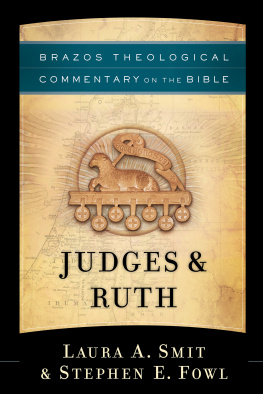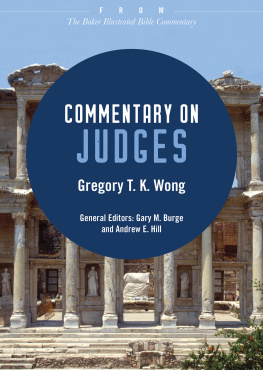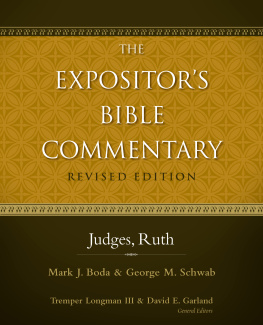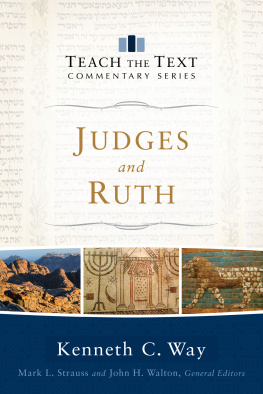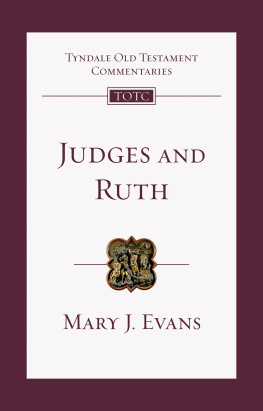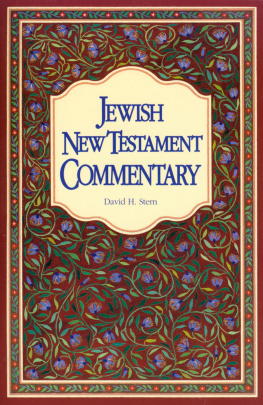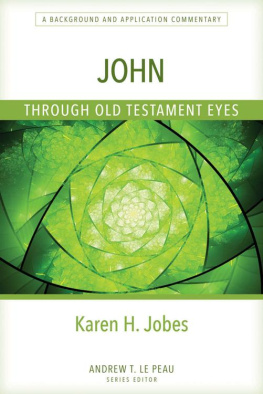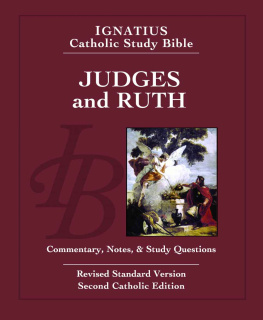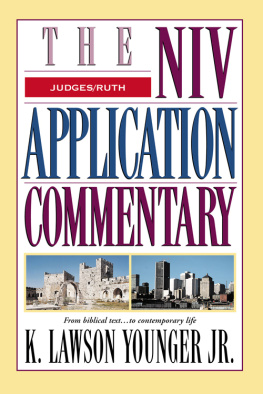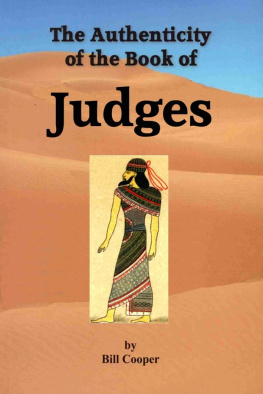THE NEW INTERNATIONAL COMMENTARY
ON THE
OLD TESTAMENT
General Editors
R. K. HARRISON
(19681993)
ROBERT L. HUBBARD, JR.
(1994 )
The Book of
JUDGES
BARRY G. WEBB
WILLIAM B. EERDMANS PUBLISHING COMPANY
GRAND RAPIDS, MICHIGAN / CAMBRIDGE, U.K.
2012 Barry G. Webb
All rights reserved
Published 2012 by
Wm. B. Eerdmans Publishing Co.
2140 Oak Industrial Drive N.E., Grand Rapids, Michigan 49505 /
P.O. Box 163, Cambridge CB3 9PU U.K.
18 17 16 15 14 13 12 7 6 5 4 3 2 1
Library of Congress Cataloging-in-Publication Data
Webb, Barry G.
The Book of Judges / Barry G. Webb.
pages cm (The New international commentary on the Old Testament)
Includes bibliographical references and index.
ISBN 978-0-8028-2628-2 (cloth: alk. paper)
ISBN 978-1-4674-3638-0 (mobi)
1. Bible. O.T. Judges Commentaries. I. Title.
BS1305.53.W43 2012
222.3207 dc23
2012018250
www.eerdmans.com
To my mother, Gladys Webb,
who passed away on 29 July 2009,
soon after her 100th birthday
CONTENTS
Long ago St. Paul wrote: I planted, Apollos watered, but God gave the growth (1 Cor. 3:6 NRSV). He was right: ministry indeed requires a team effort the collective labors of many skilled hands and minds. Someone digs up the dirt and drops in seed, while others water the ground to nourish seedlings to growth. The same team effort over time has brought this commentary series to its position of prominence today. Professor E. J. Young planted it forty years ago, enlisting its first contributors and himself writing its first published volume. Professor R. K. Harrison watered it, signing on other scholars and wisely editing everyones finished products. As General Editor, I now tend their planting, and, true to Pauls words, through four decades God has indeed graciously [given] the growth.
Today the New International Commentary on the Old Testament enjoys a wide readership of scholars, priests, pastors, rabbis, and other serious Bible students. Thousands of readers across the religious spectrum and in countless countries consult its volumes in their ongoing preaching, teaching, and research. They warmly welcome the publication of each new volume and eagerly await its eventual transformation from an emerging series into a complete commentary set. But as humanity experiences a new century of history, an era commonly called postmodern, what kind of commentary series is NICOT? What distinguishes it from other similarly well-established series?
Its volumes aim to publish biblical scholarship of the highest quality. Each contributor writes as an expert, both in the biblical text itself and in the relevant scholarly literature, and each commentary conveys the results of wide reading and careful, mature reflection. Ultimately, its spirit is eclectic, each contributor gleaning interpretive insights from any useful source, whatever its religious or philosophical viewpoint, and integrating them into his or her interpretation of a biblical book. The series draws on recent methodological innovations in biblical scholarship, for example, canon criticism, the so-called new literary criticism, reader-response theories, and sensitivity to gender-based and ethnic readings. NICOT volumes also aim to be irenic in tone, summarizing and critiquing influential views with fairness while defending their own. Its list of contributors includes male and female scholars from a number of Christian faith-groups. The diversity of contributors and their freedom to draw on all relevant methodologies give the entire series an exciting and enriching variety.
What truly distinguishes this series, however, is that it speaks from within that interpretive tradition known as evangelicalism. Evangelicalism is an informal movement within Protestantism that cuts across traditional denominational lines. Its heart and soul is the conviction that the Bible is Gods inspired Word, written by gifted human writers, through which God calls humanity to enjoy a loving personal relationship with its Creator and Savior. True to that tradition, NICOT volumes do not treat the Old Testament as just an ancient literary artifact on a par with the Iliad or Gilgamesh. They are not literary autopsies of ancient parchment cadavers but rigorous, reverent wrestlings with wonderfully human writings through which the living God speaks his powerful Word. NICOT delicately balances criticism (i.e., the use of standard critical methodologies) with humble respect, admiration, and even affection for the biblical text. As an evangelical commentary, it pays particular attention to the texts literary features, theological themes, and implications for the life of faith today.
Ultimately, NICOT aims to serve women and men of faith who desire to hear Gods voice afresh through the Old Testament. With gratitude to God for two marvelous gifts the Scriptures themselves and keen-minded scholars to explain their message I welcome readers of all kinds to savor the good fruit of this series.
ROBERT L. HUBBARD JR.
Commentaries are generally judged good or bad according to what the reader expects of them. I hope this one will satisfy those who want the meatiness and analytical character normally expected of a commentary that includes an original translation and notes. But I have chosen to write it in an emotionally warm, rather than cool, detached, academic way, partly because that is my natural writing style, partly because I think it is what is needed to engage properly with a dynamic, narrative work like the book of Judges, and partly because I think it is what people who buy and read NICOT commentaries will most want and appreciate. I have always felt cheated by the kind of exegetical vivisection that kills by analysis until all thats left is lifeless bits and pieces, classified and arranged, conquered rather than read. For me the text is a living thing, whose life has to be respected if it is to be understood.
In keeping with this general approach, I have not tried to achieve the kind of exhaustive thoroughness that insists on putting back into the text all the data that the author has left out. There is a perverseness about this that is not only pedantic but damaging, especially when it obscures the light and shade of the text, and its background and foreground distinctions, as though they dont matter. There is a proper place for background, of course, especially in an ancient work like Judges, where the original readers presumably had a knowledge of it that cannot be assumed for modern readers. No text exists in a vacuum, and the historical setting is often important for understanding. Nevertheless, the commentator, like the original author, must be selective and not try to say everything, even if this were possible. What I have tried to do in what follows, especially in the body of the commentary, is to concentrate on what the text itself throws into prominence, and give space to background issues only where I think they throw significant light on the foreground. Of course this has required judgments to be made which I am sure I have not always gotten right. But that is where footnotes prove useful; they provide a convenient middle ground between inclusion and exclusion, where those who want more may hopefully find it, or at least be pointed in the right direction. All translations from the Hebrew are my own, unless otherwise identified.
My labors on Judges began a long time ago. I spent most of 1982-84 in Sheffield, England, working on it for my Ph.D., which was published as a monograph in 1987 and again in 2008. Those familiar with it will recognize the echoes of it here. But they will also find much that is new. In particular, large parts of Judges that were treated only in summary fashion in the monograph have been treated here with the kind of even-handed thoroughness required for a commentary. New material has been added, and old material reworked in the light of new research that has been done since the 1980s. The result is a new and different kind of work. I have had to start again, even if building on old, proven foundations.
Next page

